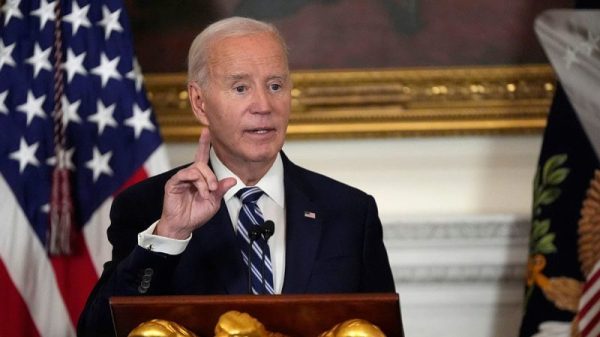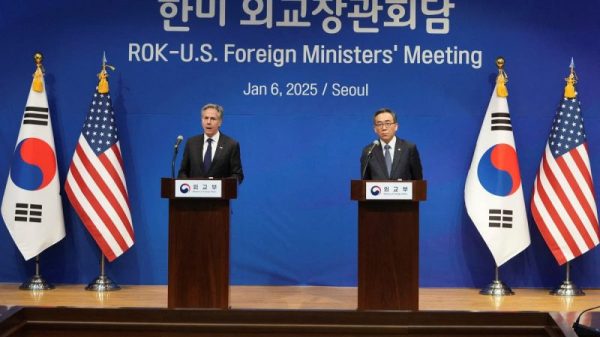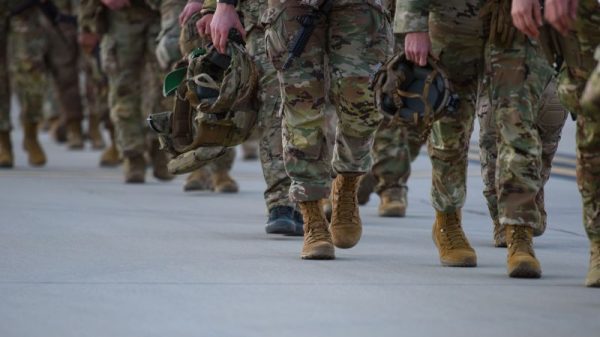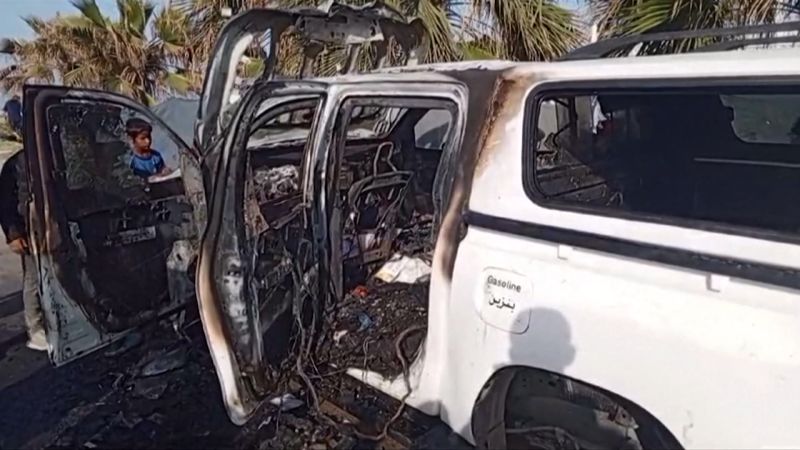Israel’s military said its troops made a series of “grave” mistakes and violated protocol in their strikes that killed seven aid workers in Gaza this week.
An Israeli inquiry published Friday found troops mistakenly thought they were attacking Hamas gunmen when drone strikes targeted three vehicles of the World Central Kitchen (WCK) late Monday night.
The Israel Defense Forces (IDF) fired two of its officers and reprimanded others for their involvement in the strikes, but WCK has said Israel cannot be trusted to investigate its own errors in Gaza, and the incident has sparked fury from many of Israel’s staunchest allies.
Here’s what we know.
What the IDF says happened
The IDF has been trying to track down and kill Hamas militants in Gaza for nearly six months, and has long accused Hamas of embedding itself in civilian areas like hospitals, schools – and with aid groups.
In its report, the IDF said its troops identified a Hamas gunman in an aid truck in the central Gazan city of Deir al-Balah on Monday, and then identified a second gunman.
“After the vehicles left the warehouse where the aid had been unloaded, one of the commanders mistakenly assumed the gunmen were located inside the accompanying vehicles and that these were Hamas terrorists,” the IDF said.
In fact, the vehicles were being driven by workers with the WCK – a charity founded by celebrity chef Jose Andres that has been helping to distribute food in Gaza as the enclave has tipped further towards famine.
But the Israeli drone operators had not been told by their higher-ups about the humanitarian convoy, according to Israel Defense Forces (IDF) spokesperson Rear Adm. Daniel Hagari. In a video statement on Friday, Hagari that “critical information regarding the humanitarian operation” did not “go properly down through the chain of command.
The drone operators proceeded to target the three vehicles with a series of strikes, killing seven workers – three Britons, a Palestinian, a US-Canadian dual citizen, an Australian and a Pole.
Because the strikes happened at night, the surveillance drones could not see the WCK logo on the vehicles, the spokesperson said. The IDF is considering distributing thermal stickers for aid vehicles to prevent this happening again in the future, he added.
After the first vehicle was struck, some of the surviving aid workers fled to the other vehicles in the convoy – which were also struck, the spokesperson said.
Who did the IDF dismiss and punish?
The IDF said the strikes were “a grave mistake stemming from a serious failure due to mistaken identification, errors in decision-making, and an attack contrary to the Standard Operating Procedures.”
In response, the Chief of the General Staff dismissed two officers: The brigade fire support commander (an officer with the rank of major), and the brigade chief of staff (an officer with the rank of colonel in reserve).
The IDF also reprimanded others: the brigade commander and 162nd Division commander.
The Chief of Staff also formally reprimanded the commander of the Southern Command for his overall responsibility in the incident.
Israel’s swift public explanation and admission of guilt is rare, as is for such senior officers to be punished.
What the WCK says
The WCK said earlier in the week that all three vehicles were clearly marked and that their movements were “in full compliance with Israeli authorities, who were aware of their itinerary, route and humanitarian mission.”
Andres accused Israel of “systematically” targeting the aid workers. In a Reuters interview, he said this was not a “bad luck situation where, ‘oops,’ we dropped the bomb in the wrong place.”
Responding to the Israeli report Friday, WCK said Israel had taken “important steps forward” in taking disciplinary action against those responsible, but warned that “without systemic change, there will be more military failures, more apologies and more grieving families.”
WCK said the incident would not have occurred if Israel had not allowed Gaza to run short of food, and called for an independent inquiry into the incident.
“We demand the creation of an independent commission to investigate the killings of our WCK colleagues. The IDF cannot credibly investigate its own failure in Gaza.”
At least 196 humanitarian workers have been killed in the West Bank and Gaza since October, according to the United Nations.
What have the consequences been?
The killing of the seven aid workers sparked condemnation from some of Israel’s most prominent supporters and may mark a turning point in how Israel perpetrates its war in Gaza.
In a phone call on Thursday, US President Joe Biden told Israeli Prime Minister Benjamin Netanyahu that the humanitarian situation in Gaza was unacceptable and warned Israel to address the crisis or face consequences.
The 30-minute conversation was the two leaders’ first phone call since the strike on the WCK convoy.
Biden also said Israel needed to “announce and implement a series of specific, concrete, and measurable steps to address civilian harm, humanitarian suffering, and the safety of aid workers.”
The UK has also responded sharply to the strikes, which killed three British nationals. Alicia Kearns, a Conservative Member of Parliament and Chair of the UK’s Foreign Affairs Select Committee, told the BBC on Friday that she believes “we have no choice but to suspend arms sales” to Israel.
Kearns said Biden’s phone call felt like a “tipping point” in the conflict, but said it is “devastating that it’s taken six months for us to get to a point where it appears that the international community is able to influence Israel’s perpetration of this war.”
Amid strong rebukes from its allies, the strikes may also have played a role in Israel’s security cabinet approving the reopening of the Erez crossing into Gaza, which has been closed since the October 7 Hamas attacks.
But distributing that aid may be difficult, after at least three aid providers said they are suspending operations in the Gaza in the wake of the deadly strikes on the WCK.
In a sign of the delicate balance in Netanyahu’s coalition government, Israel’s National Security Minister Itamar Ben Gvir criticised the firing of the army officers, calling it an “abandonment of the soldiers in the middle of a war and a grave mistake that conveys weakness. “







































